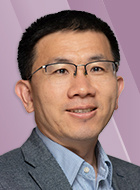
Location
Shanghai, China
Term of office as a Council member
August 2021 - August 2024 Second Term
Mr Jason Hu is currently the Senior Vice President, Researcher Services and Networks at Taylor & Francis Group. He leads a global team for researcher services and strategic partnerships, focusing on emerging markets including APAC, India and Africa.
Before joining Taylor & Francis, Mr Hu has been the Regional Director Greater China at ORCID. Previously he has worked at Wiley for many years, with various responsibilities in journal publishing, business development, market insights and strategies.
Besides his deep knowledge and experiences in academic publishing, Mr Hu is also passionate about research integrity and ethics. He has serviced as a Council Member of Committee on Publication Ethics (COPE) from 2016 to 2019. Jason holds a Master degree of Business Administration (MBA) from University of Chicago, USA.
2023 competing interest statement for Jason Hu (PDF)
Getting to know you
An interview with Jason Hu
What is your current professional position?
I’ve been working in academic publishing industry for over 15 years in various roles including editorial, insights and strategy, and partnership. Currently I am the Senior Vice President, Researcher Services and Networks at Taylor & Francis Group.
What have you been involved in that has led to your position on COPE Council?
In every organisation that I have worked, safeguarding the highest standard of ethical publication is always one of the key priorities. I strongly believe it is one of the key cornerstones of science, but there are growing issues that needs to be addressed. I have been involved in many occasions where research and publication ethics were a concern, acting as an advisor on best practices and policies, as part of the investigation team on specific cases, or as a keynote speaker to promote the ethical research and publication.
What are the most common publishing ethics issues you and your colleagues have faced?
Authorship dispute, data/image manipulation and plagiarism are still the most common issues, and since last year ‘paper mills’ has become an even more serious and salient issue.
What do you think are among the most urgent ethical issues in need of addressing?
Currently the most urgent one is how to identify publications produced by the paper mills and how to prevent them from happening. One related issue that needs to be addressed is how the journals and their editors can verify authors identity more easily and reliably while respecting privacy. Authorship is still an issue with lots of ambiguity and different understanding, interpretation and practices across regions and subject communities.
Are there any publication ethics that seems to be more of an issue with a particular demographic than others?
In countries where English is not the native language, there might be some different ethical policies and practices between local language publications and English language publications, which might lead to issues around duplicated publications, or different practices on corrections of post publication, for example the criteria on “Retraction”
Are there any particular obstacles which make it harder for anyone in the publishing cycle to comply with commonly adopted ethical practices?
One obstacle is in the communication and collaboration between funders, research institutions and publishers. I hope the situation could be improved to be much smoother, with those organisations working more closely. Currently there are still many gaps there, from whom to contact to who investigates processes, or who oversees policies and criteria.
Are there any tools or services, or processes you think would help enhance awareness or engagement with good ethical conduct?
Verifying and distinguishing authors services could help enhance the engagement and implementation of good ethical conducts. ORCID (disclaimer: I was a former employee) has been making great efforts on this specific issue. I hope all of the funders, institutions and publishers will adopt it.
Auto-detection on image manipulation is another area that I hope to see some breakthrough, currently there are some tools available, but their performances are not very satisfying yet.
Are there any areas or aspects of your work, or academic publishing in general, that you feel are missing guidelines or standards that you think would be useful?
There are more and more manuscripts posted to a wider range of preprint servers nowadays. While there is general agreement that authors shall follow the same standards and practices as in peer reviewed journals, there are missing guidelines and standards on what the preprint servers are supposed to do.
You were on COPE Council previously. What has lead you back for a new term?
I served my first term as COPE Council member from 2016 to 2019, during which I really enjoyed working with other Council members and am very proud of what we contributed together for the community. I am very keen to continue contributing to improve the awareness and practices of ethical research and publications, hence I’ve decided to re-serve for another term starting from 2021, and I appreciate the opportunity to work with COPE colleagues again.
2016
Invited speaker at Turnitin China Co-sponsored meeting with Shanghai Jiao Tong University School of Medicine, Shanghai, China, 29 September 2016
Photo copyright Philippa Gedge Photography